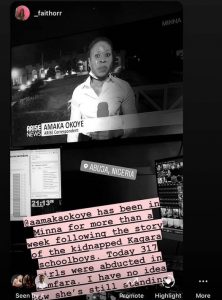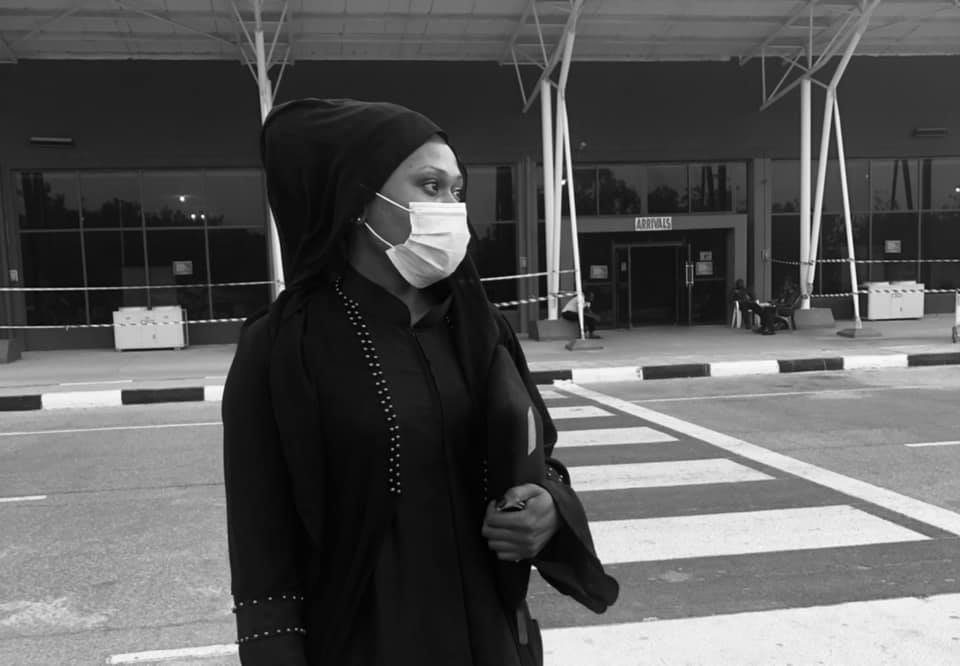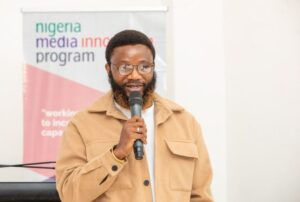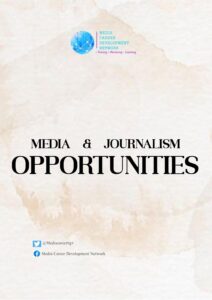Amaka Okoye Presenter/Producer at ARISE NEWS is not your regular female journalist. She has become known for her ‘dare devil’ and extensive reporting of recent cases of kidnappings in northern parts of the country.
In this online interview with Lekan Otufodunrin, Okoye formerly of Plus TV Africa shares her motivation for the kind of unique reporting she does and experience on the frontlines.
From Kankara in Katsina to Kagara, Niger and now Jangebe in Zamfara, you have become one of the faces of the very few women and men in the front line of reporting crisis situations in the country, what is the motivation for taking on this kind of assignments many journalists would not be too keen to take?
My motivation I believe is just the passion to tell stories, to give a human face to every story. As far as I am concerned, our job is to bring the story of the people. Our priority should always be the people, the people should always be the story. For me as a person, I always see it as a priviledge to tell the story of people and so, I carry everyone’s story as sacred. When people give you the opportunity to come into their lives and to share their story, it’s actually a priviledge.

My motivation is to be the people’s voice truly and being able to report, to tell those uncommon stories, that ordinarily you may not hear about them, but they are people’s story. They are people’s reality and we need to bring people’s reality to the fore. That is my motivation. When you tell people’s stories and they have hope because you pointed a touch light to their reality, their hardship, their sufferings, to their plight, that has always been my motivation.
For instance, I just got out of Kagara in Niger State and before the students were released, parents would call me and say, journalist, please tell me the truth, what do you know, are they going to be released? That people are reposing that level of trust in you is a privilege. When you report a crisis, you report people kidnapped and you are privileged to see them come back alive, it’s such a privilege. To be able to put real smiles or else their stories will be lost if that is not done and I am happy to do that.
How tough is it handling the kind of assignments which many regard as dangerous?
Absolutely and really really tough. Sometimes when I have gone to these places and come back, I sit down and ask myself Amaka how did you do it? How did you get into that place and come out? Why did you take that risk? When Katsina happened, I was like the first female journalist who was on the ground for days. We went into Kankara three times and that was a very risky place. Not was, but still really risky place, but we did three times. And there is always the feeling that there is somebody whose story needs to be told, let me just do it for the sake of this life and of course, there is always the God factor. The God who goes ahead of us. For me, I believe that God is the giver of protection and I work with that.
It is tough to do the work, to do such an assignment. For instance today (Wednesday) we narrowly escaped death in Jengebe, in Zamfara where the girls were supposed to reunite with their families and it turned bloody.
Parents were agitated to meet their loved ones after 48 hours and some of them were feeling like they need to go and government officials were busy giving speeches, making it a whole ceremony and these people broke into the school and just before we knew it, there were people holding sticks, stones, knives and some journalists were attacked. Their car was broken and she had to beg for her life. They came at her with knives and at that moment I thought we were going to die today.

The only thing I remember saying to the team was shut down everything, shut down now, shut down now, don’t film again, pack up anything that makes you vulnerable, hide anything that makes you look like a journalist, hide every camera, hide the mic and it was crazy.
We hid everything. Thankfully I was already dressed like them, retied my scarf, took off my sunshade and we stayed in the car praying and the driver went to speak with them in disguise and my other team member disguised as a local and we said no we are just commercial people and right in front of us three people were shot, someone died. That’s the kind of thing, so it is tough and I don’t even know how I do it as a woman. When people say how are you able to do it, you are a girl and I just say look at Clarissa Ward of CNN look at Nima Elbagir , Christiana Amanpour . These women have always been on the frontline and they are my mentors. They inspire the kind of stories I want to tell.
I honestly don’t know how I do it, I don’t want to lie. In the office, people look at me as a soft person and those who know me know I am a very soft person and emotional person. I cry a lot. So I don’t know where I get the strength when I get into the frontlines. I don’t know, it’s grace, it’s mercy. I don’t know how I do it, but I just know that its work that has to be done. I do remember Clarissa Ward in one of her interview said when you are in front of danger, you don’t think about it because the moment you think about it you are crippled. Just keep going, keep doing what you have to do, do not think. I suppose that is what happens to me. My instinct is always very very alert. So, when I sense danger I know and I have always worked with the best team. Like today as soon as I said to the camera guys we must leave, shut down now, we shut down, we packed. That collaboration. It is tough but we have to do what we need to do. We have to tell the stories. Somebody has to be there, to tell the truth.
In the face of armchair journalism, shoddy journalism, I am sorry to say, someone needs to be on the ground and tell the story, to tell the truth, to give the true account, to report from the scene, to give accountability, to give voice to the people, to be accurate, to give credible stories, to interrogate all sides of the stories, I honestly think that is how it happens, that is how I do it.
What sacrifices have you had to make to cover these crises situations, especially being a lady?
Absolutely I have had to make a lot of sacrifices. I am someone who has a few circle of friends. Some of the things that have happened to me are that you have to miss some of the intimate moments with loved ones. I have had to miss my niece’s birthday so many times, I have missed my friend’s wedding. I was supposed to be on the bridal train of one of my friends this Saturday but I was in Niger, Kagara that day. That’s how crazy it gets, some family moments I have had to miss many times, but when you look at the enormity of the story that needs to be told, you realise the sacrifice is worth it.
Sometimes my social life is affected because you are busy telling stories and one is supposed to be hanging out.
READ ALSO: SKILLS JOURNALISTS SHOULD LEARN TO MONETISE
Are media organizations doing enough to support their staff on the front lines based on your interactions with other journalists?
Concerning my current employment, I would honestly say I have had a real sense of being supported when we go out financially and given provision for all that we need. I have been in former employment that is not necessarily the situation. I have spoken with a few people and I don’t get that sense in Nigeria that most media organisations are doing enough in terms of protecting journalists, providing mobility, logistics, being sure that your journalists on the ground are okay, that you have everything you need to tell the story. It’s something organisations must have to look to and be deliberate and intentional and say if I am to send Amaka to the frontline Amaka is okay. Last time when our guys were covering the #End SARS, they had a bulletproof vest and Twitter went haywire that Arise Correspondents have bulletproof. Media houses have to invest in such things and take them even more seriously.
Based on your coverage of the various kidnapping incidents, do you think the government is doing enough to checkmate the activities of kidnappers, bandits and terrorists?
I am sorry to say that kidnapping and banditry have taken another dimension. Unfortunately, it looks like a criminal enterprise that is booming. We do know that statistics put it that from January 2016 to March of 2020, Nigeria has spent 11 million dollars in ransom payment. Put that money into education, we won’t be having this same conversation, put that money in infrastructure and we won’t be having this conversation we are having now. I dare to say our government has not done enough. It can be better, but they have not done enough.

Tell me about your experience studying communication and working in a radio station in Kenya?
I studied Social Communication at the Catholic University of Eastern Africa in Nairobi Kenya, at Tangaza University College. It is a college of the Catholic University. After that, I was on radio, Radio Shahidi. It was quite an exciting experience for me. Radio is interesting because it challenges your creativity more because you don’t have visuals. Your words are usually the visuals you use to paint the story and that is where I started off and maybe that is where I honed my skill of telling people’s stories. I worked as a field reporter and producer, jingle producer and documentary producer as well. I did most of my documentaries in radio. It was a short time and a good time and it put me out there and brought me in touch with my desire to really tell the peoples story.
Any other issue you will like to speak about media practice in Nigeria and your experience?
The practise of journalism in Nigeria I would say needs almost a total overhaul. We could be better journalists I believe. From my experience, one of the things I find worrying is the sort of armchair journalism that is going on and the discrepancy or the disconnect between older journalists and younger journalists where we have the argument of this is how it has always been done for the older generation and the younger generation says you did this way in your time but it can be done differently now.
There is that disconnect. I’m looking forward to seeing journalism where both interests are represented and there is harmony. So younger journalists are more than ready to learn from the wealth of experience of older journalists and the older journalists are also ready to be flexible to learn from the younger journalists the technics of the new media.
I also think that journalists also now have to be intentional and deliberately seek to tell the truth in reportage and go out of their way to seek the truth and dig deeper when it comes to issues.
I have also seen the situation which is sad because most journalists are not taken care of in terms of salaries, you see journalists who are compromised which I have seen in these past coverages that I have done. I think we need to rethink our kind of journalism in Nigeria.
I can also see the springing up of more deliberate and younger journalists that should be given the opportunity to thrive, make a difference and challenge the status quo and given the safe space to do so.





Stella John-Bell Okoye
Amaka Okoye is always an inspiration in what she does because she does it to the maximum satisfaction. I love the fire in h and how well rooted she is in her profession.many thanks indeed for featuring her.